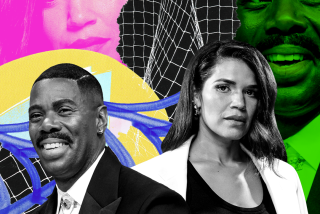Our Thoughtless Words Help Hate Killers Take Aim
- Share via
I learned a very ugly word in college. A denigrating noun that compared a race of people to a large, black beetle, considered a destructive pest in Mexico and South America.
The word is mayate. In Spanish slang, it refers to African Americans, almost an equivalent of the N-word in English. You still hear the epithet on the street today from the mouths of gang members and in prisons, where racial conflict is cultivated in close quarters.
But you also hear the creepy slur among our most educated Latinos at our best universities. I was at UC Berkeley when I first heard it used openly in a meeting of Chicano students during the Third World strike, when blacks, Asians and Latinos were pushing for ethnic studies.
I was aghast to hear activists use a pejorative term for our alleged allies in the good fight against discrimination. How can we pretend to abhor bigotry when we use the language of bigotry against others?
That’s why I have always banned such language in my home. My son was never allowed to use the word “faggot,” for example, which became popular among teens for some reason. And I’d grimace when he’d tell sixth-grade jokes with a mock Chinese accent.
No big deal, he’d say. No harm done.
Wrong. The vocabulary of bigotry is not just offensive, it’s dangerous. Words can be used as weapons to target people we despise. A slur can be fired in anger, like a bullet.
If we speak of people in demeaning terms, we keep them at a distance. Many Latinos call all Asians “chinitos,” a diminutive that belittles the Koreans, Vietnamese and Japanese we lump together with “the little Chinese” people. And it’s common to hear homosexuals referred to as maricones (like “queer” in English), even in so-called polite society.
It’s so much easier to hate certain people if we think of them as a pestilence. And when the time comes to turn hate into action, extremists can tell themselves they are improving civilization by eradicating inferior humans, like so many ugly, black insects.
So it’s not surprising that the late Benjamin Nathaniel Smith had become a proficient publicist for hate before going on a racial shooting spree over the Fourth of July holiday in Illinois and Indiana. He had been an outspoken missionary for the World Church of the Creator, a group that did a lot of nasty talking about Jews, homosexuals, blacks and “mud people,” a term he used for other minorities. Before killing himself, Smith left a multicultural trail of at least 11 dead and wounded victims--blacks, Asians and Orthodox Jews.
It was just the latest in a series of violent outbursts against minorities, from the dragging death of a black man in Texas to the firebombing of three synagogues in Sacramento and the murder of a gay couple in Northern California.
Smith’s was the quintessential hate crime, defined as “ill will seeking a victim,” says Valerie Jenness, a UCI criminologist and hate-crimes expert.
The victims are always predictable, she says. They’re the ones society has singled out as targets through the common use of bigoted language. Latinos, especially immigrants, are among those often vilified by hate groups. So we should be careful not to foment the bilingual vilification of others.
It’s comfortable to consider racial violence as an aberration, the work of nutty and isolated ideologues. But experts say murder is just an extreme manifestation of the bigotry of everyday life.
The Anti-Defamation League calls it the “pyramid of hate.” Racially motivated murders are at the peak of the triangle, supported by slurs, stereotypes and insults at the broad base.
Jenness says: “The use of that language doesn’t mean you’re going to go off and kill somebody. But it sustains the culture that leads to that.”
In other words, we don’t kill with our speech, but we help the killers take aim. That’s why I’m so strict about what people say in my presence. If you wish, call me politically correct, a term bandied about by those who can’t stand to feel inhibited about their own bigotry.
It’s no coincidence that an upsurge of racial violence has coincided with a backlash against the social pressure to be racially sensitive. In the name of free speech, we’ve allowed radio hosts to pollute our airwaves with racial trash talk. It all contributes to that culture of hate.
“We’ve just been very good lately at being tolerant of intolerance,” says Joyce Greenspan of the Anti-Defamation League’s Orange County-Long Beach chapter. “Somebody has to say it’s really not OK and it really is insensitive and we have to back off.”
Agustin Gurza’s column appears Tuesday and Saturday. Readers can reach Gurza at (714) 966-7712 or agustin.gurza@latimes.com.
More to Read
Sign up for Essential California
The most important California stories and recommendations in your inbox every morning.
You may occasionally receive promotional content from the Los Angeles Times.













